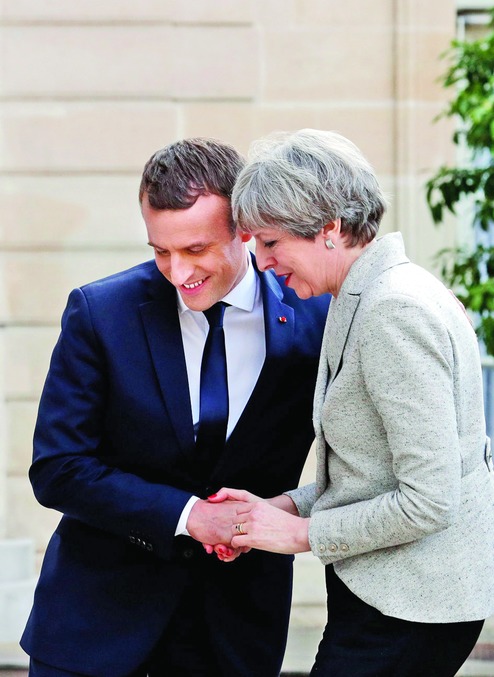
Paris, June 13 (Reuters): British Prime Minister Theresa May today said talks with Northern Ireland's DUP about a deal to support her minority government had been "productive", and confirmed that Brexit negotiations would begin next week.
May met Northern Ireland's Democratic Unionist Party (DUP) earlier today to thrash out a deal that would see the DUP support May in government after she failed to win an outright majority at an election last week.
"What we're doing in relation to the talks that we're holding, the productive talks we're holding with the Democratic Unionist Party, is ensuring that it is possible to, with their support, give the stability to the UK government that I think is necessary at this time," May told a news conference in Paris following a meeting with French President Emmanuel Macron.
"I confirmed to President Macron that the timetable for the Brexit negotiation remains on course and will begin next week."
Macron said the door to the EU remains open to the UK as long as exit negotiations are not concluded, but it would be difficult to walk back once negotiations start.
Asked at a joint news conference with May in Paris whether he agreed with German finance minister Wolfgang Schaeuble who earlier told Bloomberg that Britain would find "open doors" if it changed its mind, Macron replied: "The door of course is still open as long as Brexit negotiations have not been concluded, but a sovereign decision to leave the EU has been taken and I respect that decision."
The two leaders met for a working dinner before together attending a France vs England friendly soccer match at the Stade de France stadium in Paris.
May faces a tug-of-war within her own party over her Brexit strategy following the disastrous snap election .
Before the election May had proposed a clean break from the EU, involving a withdrawal from Europe's single market, but now weakened with a minority government, some in her party are calling for a more business-friendly approach.
After meeting May for the first time during the French presidential campaign last February, Macron had said the British Prime Minister should not expect any favours from the EU during Brexit talks.
He told reporters outside 10 Downing Street at the time that "an exit is an exit".
Today, May and Macron also said they had agreed on an action plan on counter-terrorism. Both countries have been hit by deadly militant attacks in recent months.
Macron said Internet companies would be asked to do more to remove content promoting terrorism, access to encrypted content on online messaging systems would be widened, and co-operation with the US on online content would be improved.
In an attempt to avoid a second election that could deepen Britain's worst political turmoil since last June's shock vote to leave the EU, May held talks with the DUP today.
She met DUP leader Arlene Foster, whose eurosceptic Northern Irish party has 10 parliamentary seats, for over one hour of talks in Downing Street, though both May and Foster later left through different exits. "Discussions are going well with the government," Foster said on Twitter. "We hope soon to be able to bring this work to a successful conclusion." A Downing Street spokesman declined to comment.
But a deal with the DUP risks destabilising the political balance in Northern Ireland by increasing the influence of pro-British unionists who have struggled for years with Irish Catholic nationalists who want Northern Ireland to join a united Ireland.
Former Prime Minister John Major said he was concerned a deal with the DUP could thrust the province back towards violence nearly two decades since a US-brokered peace deal brought peace to Northern Ireland.
"The last thing anybody wishes to see is one or other of the communities so aggrieved that the hard men, who are still there lurking in the corners of the communities, decide that they wish to return to some form of violence," Major told BBC radio. "I am concerned about the deal. I am wary about it," Major said.
While the DUP are deeply eurosceptic, they have balked at some of the practical implications of a so-called hard Brexit.











